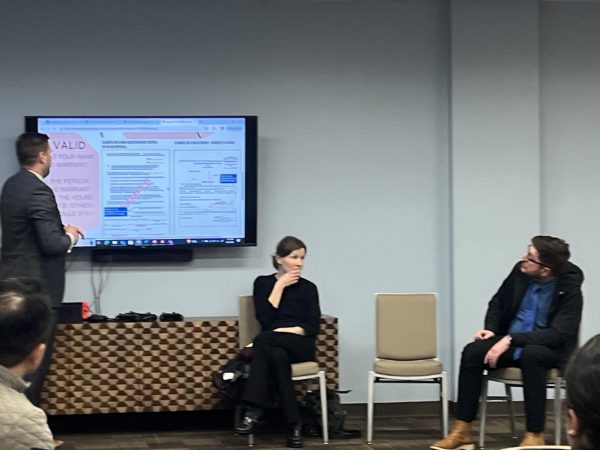
A panel was held in the Weter collegium on Wednesday, April 2 to inform and answer questions concerning the topic of new immigration policies and how they might affect students at SPU and the potential threat of deportation in light of recent changes in the political landscape. Headed by immigration attorneys Adam Boyd, Ben Cornell and Fiona McKinnon, the conference provided insight into the threat posed by the U.S. Immigration and Customs Enforcement, better known as ICE, detailing their methods and how to counter them. In addition, the panelists cleared up confusion on the topic of student Visas for international students, explaining what circumstances can cause them to be revoked.
ICE took the center stage in the conference, and Boyd, the panel’s most prominent speaker, made no attempt to sugarcoat the situation.
“A lot of people think ‘Oh, if I’m just reasonable with these people, they’ll be reasonable with me’, and that’s not the case,” Boyd said. “Their orders are to detain people to the maximum extent possible, and that includes people without any criminal record.”
Boyd went on to give advice on how one might tactfully avoid trouble with ICE. First, if ICE comes to your place of residence, you are not required to open the door and encouraged not to. Second, you should never disclose your immigration status. Third, it must be known that ICE cannot search or make an arrest on private property unless they have a warrant approved by a court. Boyd emphasized that the warrant has to be issued by a court, and no other warrant would suffice; ICE will often attempt to exercise authority with an improper warrant.
“ICE will often try to trick people,” Boyd said. “They’re never your friend, and most of the time, they’re giving the wrong information.”
Knowing the difference between a court warrant and an administrative warrant is vital. Luckily, this difference is easily discernible; a court-issued warrant can be easily found on the internet, the panelists stated.
While these are ways to protect yourself on private property, McKinnon clarified that ICE are able to make arrests in public without the need of a warrant. Cornell added that ICE will often surveille potential targets, waiting for them to leave the safety of their homes.
Cornell confirmed that non-immigrant Visas can, in fact, be revoked; criminal offenses such as a DUI or possession of narcotics have been known to result in the revoking of a Visa.
Boyd states that during the Biden administration, criminal offenses were the primary target of deportations. President Trump, officially, shifted the focus to those who have overstayed their Visas. However, ICE has been officially documented requesting the terminations of Visas. “Over 300 students [at other universities] have had their Visas revoked,” McKinnen said.
“It’s a shitshow,” Boyd stated in regard to the matter. The new issues surrounding student Visas and the I-20 have created a great deal of trouble for students who might leave the US for whatever reason and attempt to return. To protect those in the country via Visa, Seattle Pacific University has stated that they are under no obligation to disclose any information on its students.
With the upcoming termination of the Temporary Protected Status being one of the foremost causes for concern. The government attitude toward immigration has unmistakably caused a great deal of harm.
“We’ll see TPS orders changing in the near future” Cornell said towards the end of the conference. “I don’t know why there isn’t revolution in the streets,” Boyd said.
















































































